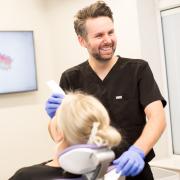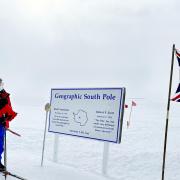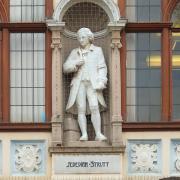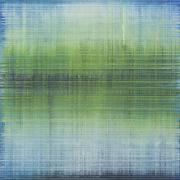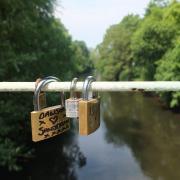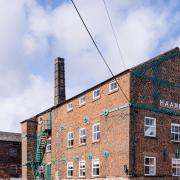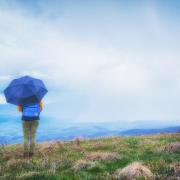Wirksworth’s Aquabox charity has been saving lives for over 25 years. Catherine Roth talks to Mike Tomlinson about delivering clean water and humanitarian aid to disaster hit regions across the world

Aquabox, a registered charity, was founded by the Rotary Club of Wirksworth in 1992. The Rotary Club had already been supplying emergency aid boxes to people in need; however, the containers were made from plywood and, being neither an adequate size for storage nor suited to firewood, meant the boxes fulfilled no further purpose when emptied. It wasn’t long before the Wirksworth Rotarians came up with the idea of using plastic boxes and then of housing a water purification system in each to provide safe drinking water. And so it was that Aquabox was born.
Since then the charity has distributed more than 110,000 boxes to hundreds of thousands of people in over 50 countries hit by earthquakes, tsunamis, landslides and wars. With deadly water-borne diseases including typhoid, cholera and dysentery spreading rapidly, Aquabox has saved countless lives by making foul water clean and drinkable again. It does this through its AquaFilter system, pioneered by fellow Rotarian John Griffiths.
Mike Tomlinson, Chair of Trustees for Aquabox, says, ‘We previously used chlorine based tablets and charcoal filters. These had a limited life producing around 1,100 litres of clean drinking water. Now we use micropore filtration which doesn’t involve any chemicals. These new filters can produce half a million litres which is the equivalent of 10 cups a day for a family of five for four years or more.’
The pumps take up very little space which means that each box can be packed full of humanitarian aid, totalling around 70 items including everything from cooking utensils, hygiene equipment, tools, shelter materials, baby and children’s clothing and educational items.

The contents of the boxes are constantly reviewed with changes made where necessary. Mike says, ‘We now put a bright solar lamp into the Aqua Gold Box so that children can carry on with their school work after it goes dark, which is very valuable. In some countries it can go dark immediately around five or six o’clock in the evening. It is not gradual like in this country but is instead just like drawing a curtain.’
Where possible, alternative materials are also sourced. Mike says, ‘We used to include enamel plates in the boxes but found that they became chipped and could cause infection. We now use more hygienic bamboo plates, beakers and cups. When we first had them our Treasurer put them in the dishwasher for a fortnight to see if they were okay and they were!’
During one year Aquabox will despatch on average between 2,500 to 3,000 boxes. Its busiest period is the autumn hurricane season so during the summer the charity will build up a stock of 1,000 boxes in preparation for disasters striking. Mike says, ‘We await people’s calls for help asking us for boxes. Calls for help can come from Rotary clubs and partner charities. Sometimes we identify places ourselves that we’ve seen on the internet and will ask charities if they would like us to send boxes.’
Aquabox works with a number of charities including Hand in Hand For Syria, Humanity First, Muslim Aid and Christian African Relief Trust as well as other Rotary clubs. Mike says, ‘We won’t send any boxes out unless we have a guarantee that someone will collect them from customs and despatch them for us at the other end. We try to be as efficient as we can and get feedback.’

Over the last few years Aquabox has despatched 4,000 boxes to Syria, sending them to Turkey before Hand in Hand for Syria transfers them into its own vehicles to drive into various parts of Syria. Mike says, ‘People are being pushed out of Aleppo but they don’t all want to leave their country so have set up homes in the hills. Hand in Hand for Syria delivers our boxes to them there. We receive brilliant feedback from the charity including video footage of the boxes being distributed and we’re confident of where they go.’
Sometimes it can just be clean water that is needed, not additional humanitarian aid. In these instances, Aquabox ships out its aptly titled Aqua 12 boxes. These each contain 12 filters enabling 12 families access to clean water and have recently been shipped to Nepal and the Caribbean islands. Aquabox also dispatches Community Filters, which are provided by the Safe Water Trust. Mike says, ‘These are sent to those places where people come together to meet, such as church halls, hospitals, community centres and schools. The Community Filter provides at least one million litres of safe drinking water.’ Where community filters have been installed in the Gambia, there has been a significant increase in school attendance, thanks to clean water leading to better health.
Over the last year alone Aquabox has provided clean water to communities in Bangladesh, the British Virgin Islands, Eritrea, Kenya, Malawi, Peru, Puerto Rico, Syria and Uganda.
Apart from one part-time paid member of staff, Aquabox is run entirely by volunteers and was recognised for its services to volunteering when it was presented with the Queen’s Award for Voluntary Service in 2016. A core team of 70 volunteers arrive at the depot every week to either assemble the filters, pack the boxes or stack the shelves ready for the following week. The charity aims to keep 500 boxes in stock at its depot, enough to completely fill a 40ft container, but will respond accordingly to disasters. Mike says, ‘We have a lot of volunteers who are prepared to come in at the drop of a hat to fill more boxes when there is a disaster – as long as we have the funds to do so. After the 2004 tsunami we sent out 10,000 boxes in three months.’

Aquabox is funded solely by donations and volunteers and supporters have even stepped up to the challenge of raising funds through more unusual activities such as walking over the O2 Dome in London. Volunteers also give talks at Rotary clubs, conferences, churches, schools and community groups to raise awareness of Aquabox. They certainly have plenty to talk about as they reflect on the lives they have saved and continue to save. Mike says, ‘When we started 26 years ago we would send out between 15 to 25 boxes a week to whoever wanted to fill them. No one could have dreamt we’d now be occupying all these premises and filling and dispatching the number of boxes we are doing.’
Neither did they dream that Aquabox would become international. Inspired by the work in Wirksworth, a Rotary club in Ontario, Canada, and another in Eltham, Australia, founded their own independent charities using the same name. Indeed Wirksworth’s Aquabox provided Eltham with funds to enable it to get started. Mike says, ‘Aquabox in Australia can reach places such as Indonesia quicker than we can.’ He adds, ‘In five to 10 years’ time, as well as continuing our work in Wirksworth, we would like to be making progress in satellite areas in other parts of the world including parts of India, Africa, North America and South America.’
Whilst Aquabox is relatively small, its vision and commitment to delivering aid and safe drinking water to thousands of people all over the world each year is quite the opposite – and well worth raising a glass of clean water to.







